普通高等学校招生全国统一考试英语试题(全国卷3,含答案).doc
2020年普通高等学校招生全国统一考试英语试题(全国卷,含答案)
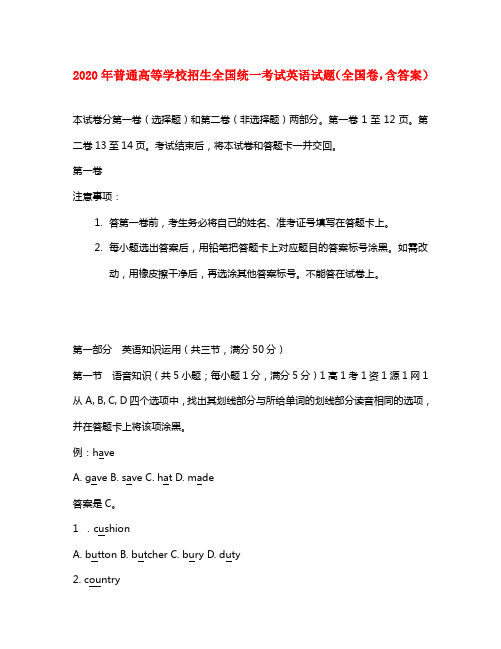
2020年普通高等学校招生全国统一考试英语试题(全国卷,含答案)本试卷分第一卷(选择题)和第二卷(非选择题)两部分。
第一卷1至12页。
第二卷13至14页。
考试结束后,将本试卷和答题卡一并交回。
第一卷注意事项:1.答第一卷前,考生务必将自己的姓名、准考证号填写在答题卡上。
2.每小题选出答案后,用铅笔把答题卡上对应题目的答案标号涂黑。
如需改动,用橡皮擦干净后,再选涂其他答案标号。
不能答在试卷上。
第一部分英语知识运用(共三节,满分50分)第一节语音知识(共5小题;每小题1分,满分5分)1高1考1资1源1网1 从A, B, C, D四个选项中,找出其划线部分与所给单词的划线部分读音相同的选项,并在答题卡上将该项涂黑。
例:haveA. gaveB. saveC. hatD. made答案是C。
1 .cushionA. buttonB. butcherC. buryD. duty2. countryA.announceB. coughC. encourageD. shoulder3 .pillowA. flowerB. allowC. knowledgeD. follow4. reachA. breatheB. reallyC. pleasureD. heaven5 .ChristmasA. handkerchiefB. teacherC. acheD. merchant第二节语法和词汇知识(共15小题;每小题1分,满分15分)从A, B, C, D四个选项中,选出可以填入空白处的最佳选项,并在答题卡上将该项涂黑。
例:It is generally considered unwise to give a child he or she wants.A. howeverB. whateverC. whicheverD. whenever答案是B。
6. ----Did you forget about my birthday?---- I’ve booked a table at Michel’s restaurant for this evening.A. What then?B. I’m afraid so.C. how could I?D. For sure.7. Ted came for the weekend wearing only some shorts and a T-shirt, is a stupid thing to do in such weather.A. thisB. thatC. whatD. which8. If you smoke, please go outside.A. canB. shouldC. mustD. may9. If you don't like the drink you______just leave it and try a different one.A. orderedB. are orderingC. will orderD. had ordered10. Mary, I_____John of his promise to help you.A. toldB. remindedC. warnedD. advised11. I got this bicycle for ;My friend gave it to me when she bought a new one.A. everythingB. somethingC. anythingD. nothing12. It is one thing to enjoy listening to good music, but it is another to play it well yourself.A. quiteB. veryC. ratherD. much13. Jane won’t join us for dinner tonight and .A. neither won’t TomB. Tom won’t eitherC. Tom will tooD. so will Tom14. This shop will be closed for repairs further notice.A. withB. untilC. forD. at15. The island, to the mainland by a bridge, is easy to go to.A. joiningB. to joinC. joinedD. having joined16. As he reached front door, Jack saw strange sight.A. the;不填B. a; theC.不填aD. the; a 17.Mr. Stevenson is great to work for -- I really couldn't ask for a_boss.A. betterB. goodC. bestD. still better 18.Sarah pretended to be cheerful,______nothing about the argument.A. says B: said C. to say D. saying19. It was a nice meal,_______a little expensive.A. thoughB. whetherC. asD. since20.-----So you gave her your phone?-----______she said she'd return it to me when she could afford her own.A. My pleasureB. Not exactlyC. No doubtD. All right第三节完形填空(共20小题;每小题1.5分,满分30分)阅读下面短文,从短文后各题所给的四个选项(A, B, C和D)中,选出可以填入空白处的最佳选项飞并在答题卡上将该项涂黑。
2020年全国卷Ⅲ英语高考试题及答案(word版)
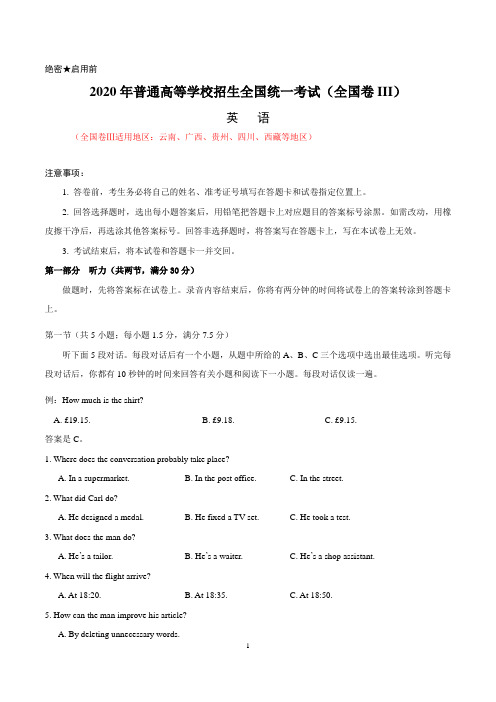
绝密★启用前2020年普通高等学校招生全国统一考试(全国卷III)英语(全国卷Ⅲ适用地区:云南、广西、贵州、四川、西藏等地区)注意事项:1. 答卷前,考生务必将自己的姓名、准考证号填写在答题卡和试卷指定位置上。
2. 回答选择题时,选出每小题答案后,用铅笔把答题卡上对应题目的答案标号涂黑。
如需改动,用橡皮擦干净后,再选涂其他答案标号。
回答非选择题时,将答案写在答题卡上,写在本试卷上无效。
3. 考试结束后,将本试卷和答题卡一并交回。
第一部分听力(共两节,满分30分)做题时,先将答案标在试卷上。
录音内容结束后,你将有两分钟的时间将试卷上的答案转涂到答题卡上。
第一节(共5小题;每小题1.5分,满分7.5分)听下面5段对话。
每段对话后有一个小题,从题中所给的A、B、C三个选项中选出最佳选项。
听完每段对话后,你都有10秒钟的时间来回答有关小题和阅读下一小题。
每段对话仅读一遍。
例:How much is the shirt?A. £19.15.B. £9.18.C. £9.15.答案是C。
1. Where does the conversation probably take place?A. In a supermarket.B. In the post office.C. In the street.2. What did Carl do?A. He designed a medal.B. He fixed a TV set.C. He took a test.3. What does the man do?A. He’s a tailor.B. He’s a waiter.C. He’s a shop assistant.4. When will the flight arrive?A. At 18:20.B. At 18:35.C. At 18:50.5. How can the man improve his article?A. By deleting unnecessary words.B. By adding a couple of points.C. By correcting grammar mistakes.第二节(共15小题;每小题1.5分,满分22.5分)听下面5段对话或独白。
2020年普通高等学校招生全国统一考试(英语全国卷III)(word附答案)

绝密★启用前2020年普通高等学校招生全国统一考试(全国卷III)英语注意事项:1. 答卷前,考生务必将自己的姓名、准考证号填写在答题卡和试卷指定位置上。
2. 回答选择题时,选出每小题答案后,用铅笔把答题卡上对应题目的答案标号涂黑。
如需改动,用橡皮擦干净后,再选涂其他答案标号。
回答非选择题时,将答案写在答题卡上,写在本试卷上无效。
3. 考试结束后,将本试卷和答题卡一并交回。
第一部分听力(共两节,满分30分)做题时,先将答案标在试卷上。
录音内容结束后,你将有两分钟的时间将试卷上的答案转涂到答题卡上。
第一节(共5小题;每小题1.5分,满分7.5分)听下面5段对话。
每段对话后有一个小题,从题中所给的A、B、C三个选项中选出最佳选项。
听完每段对话后,你都有10秒钟的时间来回答有关小题和阅读下一小题。
每段对话仅读一遍。
例:How much is the shirt?A. £19.15.B. £9.18.C. £9.15.答案是C。
1. Where does the conversation probably take place?A. In a supermarket.B. In the post office.C. In the street.2. What did Carl do?A. He designed a medal.B. He fixed a TV set.C. He took a test.3. What does the man do?A. He’s a tailor.B. He’s a waiter.C. He’s a shop assistant.4. When will the flight arrive?A. At 18:20.B. At 18:35.C. At 18:50.5. How can the man improve his article?A. By deleting unnecessary words.B. By adding a couple of points.C. By correcting grammar mistakes.第二节(共15小题;每小题1.5分,满分22.5分)听下面5段对话或独白。
2019-2020普通高等学校招生全国统一考试英语试题(全国卷3,含解析)

2018年普通高等学校招生全国统一考试英语试题(全国卷3)注意事项:1. 答卷前,考生务必将自己的姓名、准考证号填写在答题卡上。
2. 作答时,务必将答案写在答题卡上,写在本试卷及草稿纸上无效。
3. 考试结束后,将本试卷和答题卡一并交回。
第一部分听力(共两节,满分30分)做题时,先将答案标在试卷上。
录音内容结束后,你将有两分钟的时间将试卷上的答案转涂到答题卡上。
第一节(共5小题;每小题1.5分,满分7.5分)听下面5短对话,每段对话后有一个小题,从题中给的A、B、C三个选项中选出最佳选项。
听完每段对话后,你都有10秒钟的时间来回答有关小题和阅读下一小题。
每段对话仅读一遍。
例:How much is the shirt?A.£19.15.B.£9.18.C.£9.15.1. What does John find difficult in learning German?A. Pronunciation.B. Vocabulary.C. Grammar.【答案】C2. What is the probable relationship between the speakers?A. Colleagues.B. Brother and sister.C. Teacher and student.【答案】A3. Where does the conversation probably take place?A. In a bank.B. At a ticket office.C. On a train.【答案】B4. What are the speakers talking about?A. A restaurant.B. A street.C. A dish.【答案】A5. What does the woman think of her interview?A. It was tough.B. It was interesting.C. It was successful.【答案】C第二节(共15小题;每小题1.5分,满分22.5分)听下面5段对话或独白,每段对话或独白后有几个小题,从题中所给的A、B、C三个选项中选出最佳选项。
2016年英语高考试题全国卷3(含答案)
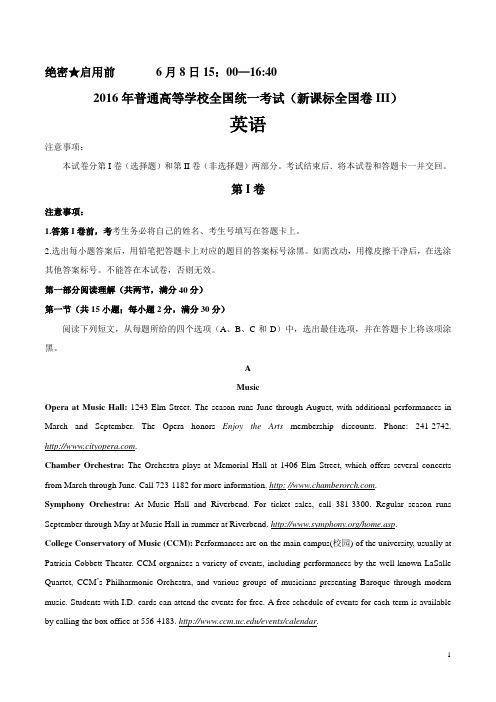
绝密★启用前6月8日15:00—16:402016年普通高等学校全国统一考试(新课标全国卷III)英语注意事项:本试卷分第I卷(选择题)和第II卷(非选择题)两部分。
考试结束后.将本试卷和答题卡一并交回。
第I卷注意事项:1.答第I卷前,考考生务必将自己的姓名、考生号填写在答题卡上。
2.选出每小题答案后,用铅笔把答题卡上对应的题目的答案标号涂黑。
如需改动,用橡皮擦干净后,在选涂其他答案标号。
不能答在本试卷,否则无效。
第一部分阅读理解(共两节,满分40分)第一节(共15小题;每小题2分,满分30分)阅读下列短文,从每题所给的四个选项(A、B、C和D)中,选出最佳选项,并在答题卡上将该项涂黑。
AMusicOpera at Music Hall: 1243 Elm Street. The season runs June through August, with additional performances in March and September. The Opera honors Enjoy the Arts membership discounts. Phone: 241-2742. .Chamber Orchestra: The Orchestra plays at Memorial Hall at 1406 Elm Street, which offers several concerts from March through June. Call 723-1182 for more information. .Symphony Orchestra: At Music Hall and Riverbend. For ticket sales, call 381-3300. Regular season runs September through May at Music Hall in summer at Riverbend. /home.asp.College Conservatory of Music (CCM): Performances are on the main campus(校园) of the university, usually at Patricia Cobbett Theater. CCM organizes a variety of events, including performances by the well-known LaSalle Quartet, CCM’s Philharmonic Orchestra, and various groups of musicians presenting Baroque through modern music. Students with I.D. cards can attend the events for free. A free schedule of events for each term is available by calling the box office at 556-4183. /events/calendar.Riverbend Music Theater: 6295 Kellogg Ave. Large outdoor theater with the closest seats under cover (price difference).Big name shows all summer long! Phone:232-6220. .1. Which number should you call if you want to see an opera?A. 241-2742.B. 723-1182.C. 381-3300.D. 232-6220.2. When can you go to a concert by Chamber Orchestra?A. February.B. May.C. August.D. November.3.Where can students go for free performances with their I.D. cards?A. Music Hall.B. Memorial Hall.C. Patricia Cobbett Theater.D. Riverbend Music Theater.4. How is Riverbend Music Theater different from the other places?A. It has seats in the open air.B. It gives shows all year round.C. It offers membership discounts.D. It presents famous musical works.BOn one of her trips to New York several years ago, Eudora Welty decided to take a couple of New York friends out to dinner. They settled in at a comfortable East Side cafe and within minutes, another customer was approaching their table.“Hey, aren’t you from Mississippi?” the elegant, white-haired writer remembered being asked by the stranger. “I’m from Mississippi too.”Without a second thought, the woman joined the Welty party. When her dinner partner showed up, she also pulled up a chair.“They began telling me all the news of Mississippi,” Welty said. “I didn’t know what my New York friends were thinking.”Taxis on a rainy New York night are rarer than sunshine. By the time the group got up to leave, it was pouring outside. Welty’s new friends immediately sent a waiter to find a cab. Heading back downtown toward her hotel, her big-city friends were amazed at the turn of events that had changed their Big Apple dinner into a Mississippi.“My friends said: ‘Now we believe your stories,’” Welty added. “And I said: ‘Now you know. These are the people that make me write them.’”Sitting on a sofa in her room, Welty, a slim figure in a simple gray dress, looked pleased with this explanation.“I don’t make them up,” she said of the characters in her fiction these last 50 or so years. “I don’t have to.”Beauticians, bartenders, piano players and people with purple hats, Welty’s people come from afternoons spent visiting with old friends, from walks through the streets of her native Jackson, Miss., from conversations overheard on a bus. It annoys Welty that, at 78, her left ear has now given out. Sometimes, sitting on a bus or a train, she hears only a fragment(片段) of a particularly interesting story.5. What happened when Welty was with her friends at the cafe?A. Two strangers joined her.B. Her childhood friends came in.C. A heavy rain ruined the dinner.D. Some people held a party there.6. The underlined word “them” in Paragraph 6 refers to Welty’s .A. readersB. partiesC. friendsD. stories7. What can we learn about the characters in Welty’s fiction?A. They live in big cities.B. They are mostly women.C. They come from real life.D. They are pleasure seekers.CIf you are a fruit grower—or would like to become one—take advantage of Apple Day to see what’s around. It’s called Apple Day but in practice it’s more like Apple Month. The day itself is on October 21, but since it has caught on, events now spread out over most of October around Britain.Visiting an apple event is a good chance to see, and often taste, a wide variety of apples. To people who are used to the limited choice of apples such as Golden Delicious and Royal Gala in supermarkets, it can be quite an eye opener to see the range of classical apples still in existence, such as Decio which was grown by the Romans. Although it doesn’t taste of anything special, it’s still worth a try, as is the knobbly(多疙瘩的) Cat’s Head which is more of a curiosity than anything else.There are also varieties developed to suit specific local conditions. One of the very best varieties for eating quality is Orleans Reinette, but you’ll need a warm, sheltered place with perfect soil to grow it, so it’s a pipe dream for most apple lovers who fall for it.At the events, you can meet expert growers and discuss which ones will best suit your conditions, and because these are family affairs, children are well catered for with apple-themed fun and games.Apple Days are being held at all sorts of places with an interest in fruit, including stately gardens and commercial orchards(果园).If you want to have a real orchard experience, try visiting the National Fruit Collection at Brogdale, near Faversham in Kent.8.What can people do at the apple events?A. Attend experts’ lectures.B. Visit fruit-loving families.C. Plant fruit trees in an orchard.D. Taste many kinds of apples.9.What can we learn about Decio?A. It is a new variety.B. It has a strange look.C. It is rarely seen now.D. It has a special taste.10. What does the underlined phrase “a pipe dream” in Paragraph 3mean?A. A practical idea.B. A vain hope.C.A brilliant plan.D. A selfish desire.11.What is the author’s p urpose in writing the text?A. To show how to grow apples.B .To introduce an apple festival.C. To help people select apples.D. To promote apple research.DBad news sells. If it bleeds, it leads. No news is good news, and good news is no news. Those are the classic rules for the evening broadcasts and the morning papers. But now that information is being spread and monitored(监控) in different ways, researchers are discovering new rules. By tracking people’s e-mails and online posts, scientists have found that good news can spread faster and farther than disasters and sob stories.“The ‘if it bleeds’ rule works for mass media,” says Jonah Berger, a scholar at the University of Pennsylvania. “They want your eyeballs and don’t care how you’re feeling. But when you share a story with your friends, you care a lot more how they react. You don’t want them to think of you as a Debbie Downer.”Researchers analyzing word-of-mouth communication—e-mails, Web posts and reviews, face-to-face conversations—found that it tended to be more positive than negative(消极的), but that didn’t necessarily mean people preferred positive news. Was positive news shared more often simply because people experienced moregood things than bad things? To test for that possibility, Dr. Berger looked at how people spread a particular set of news stories: thousands of articles on The New York Times’ website. He and a Penn colleague analyzed the “most e-mailed” list for six months. One of his fir st findings was that articles in the science section were much more likely to make the list than non-science articles. He found that science amazed Times’ readers and made them want to share this positive feeling with others.Readers also tended to share articles that were exciting or funny, or that inspired negative feelings like anger or anxiety, but not articles that left them merely sad. They needed to be aroused(激发) one way or the other, and they preferred good news to bad. The more positive an article, the more likely it was to be shared, as Dr. Berger explains in his new book, “Contagious: Why Things Catch On.”12 .What do the classic rules mentioned in the text apply to?A. News reports.B. Research papers.C .Private e-mails. D. Daily conversations.13. What can we infer about people like Debbie Downer?A. They’re socially inactive.B. They’re good at telling stories.C. They’re inconsiderate of others.D. They’re careful with their words.14.Which tended to be the most e-mailed according to Dr. Berger’s research?A . Sports new. B. Science articles.C. Personal accounts.D. Financial reviews.15 .What can be a suitable title for the text?A. Sad Stories Travel Far and WideB .Online News Attracts More PeopleC. Reading Habits Change with the TimesD. Good News Beats Bad on Social Networks第二节(共5小题;每小题2分,满分10分)根据短文内容,从短文后的选项中选出能填入空白处的最佳选项。
2020年普通高等学校招生全国统一考试英语试题(全国卷,含答案)
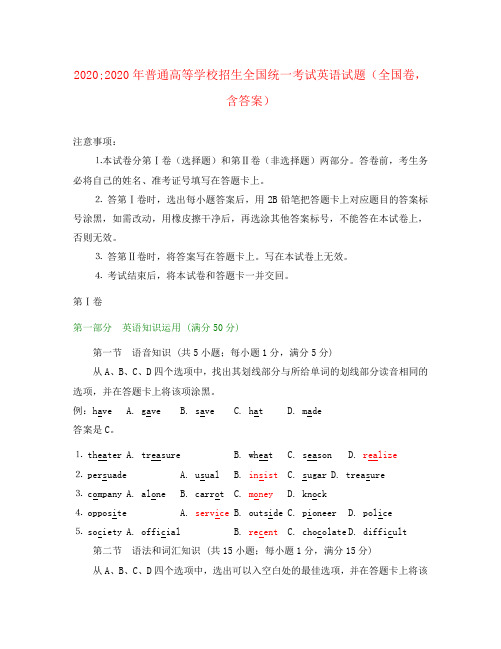
2020;2020年普通高等学校招生全国统一考试英语试题(全国卷,含答案)注意事项:⒈本试卷分第Ⅰ卷(选择题)和第Ⅱ卷(非选择题)两部分。
答卷前,考生务必将自己的姓名、准考证号填写在答题卡上。
⒉答第Ⅰ卷时,选出每小题答案后,用2B铅笔把答题卡上对应题目的答案标号涂黑,如需改动,用橡皮擦干净后,再选涂其他答案标号,不能答在本试卷上,否则无效。
⒊答第Ⅱ卷时,将答案写在答题卡上。
写在本试卷上无效。
⒋考试结束后,将本试卷和答题卡一并交回。
第Ⅰ卷第一部分英语知识运用 (满分50分)第一节语音知识 (共5小题;每小题1分,满分5分)从A、B、C、D四个选项中,找出其划线部分与所给单词的划线部分读音相同的选项,并在答题卡上将该项涂黑。
例:have A. gave B. save C. hat D. made答案是C。
⒈ th eater A. treasure B. wheat C. season D. realize⒉ persuade A. usual B. insist C. sugar D. treasure⒊ c ompany A. alone B. carrot C. money D. knock⒋ oppos ite A. service B. outside C. pioneer D. police⒌ society A. official B. recent C. chocolate D. difficult第二节语法和词汇知识 (共15小题;每小题1分,满分15分)从A、B、C、D四个选项中,选出可以入空白处的最佳选项,并在答题卡上将该项涂黑。
例:It is generally considered unwise to give a child ___ he or she wants.A. howeverB. whateverC. whicheverD. whenever答案是B。
⒍ – What shall we do tonight then?– ___ – whatever you want.A. Help yourselfB. It’s a dealC. No problemD.It’s up to you⒎ He missed ___ gold in the high jump, but will get ___ second chance inthe long jump.A. the; theB. 不填; aC. the; aD. a; 不填⒏ That evening, ___ I will tell you more about later, I ended up workingvery late.A. thatB. whichC. whatD. when⒐ Sarah made ___ to the airport just in time to catch her plane this morning.A. herselfB. thisC. thatD. it⒑ Tony lent me the money, ___ that I’d do as much for him.A. hopingB. to hopeC. hopedD. having hoped⒒ I had hardly got to the office ___ my wife phone me to go back home at once.A. whenB. thanC. untilD. after⒓ We ___ to paint the whole house but finished only the front part that day.A. set aboutB. set upC. set outD. set down⒔ Next to biology, I like physics ___ .A. betterB. bestC. the betterD. very well⒕– Did you ask Sophia for help?– I ___ need to – I managed perfectly well on my own.A. wouldn’tB. don’tC. didn’tD. won’t⒖ The old man sat in front of the television every evening, happy ___ anything that happened to be on.A. to watchB. watchingC. watchedD. to have watched⒗ 100℃ is the temperature ___ which water will boil.A. forB. atC. onD. of⒘ I’m going to Europe on vacation together with John if I ___ find the money.A. canB. mightC. wouldD. need⒙ The manager ___ the workers how to improve the program since 9 a.m. A. has told B. is telling C. has been telling D. will havetold⒚ The Harry Potter books are quite popular; they are in great ___ in this city.A. qualityB. progressC. productionD. demand⒛– Try not to work yourself too hard. Take it easy.– Thanks. ___A. So what?B. No way.C. What for?D. You, too.第三节完形填空 (每小题1. 5分)阅读下面短文,从短文后各题所给的四个选项 (A、B、C和D) 中,选出可以填入空白处的最佳选项,并在答题卡上将该项涂黑。
2016年高考英语全国卷3(含详细答案)
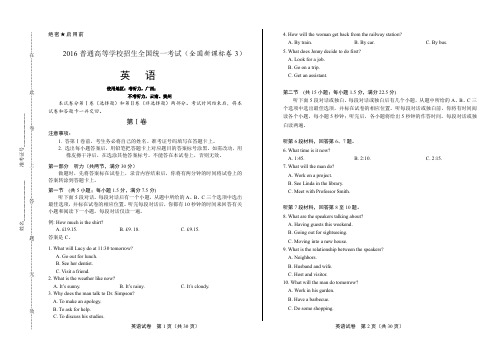
英语试卷 第1页(共30页)英语试卷 第2页(共30页)绝密★启用前 2016普通高等学校招生全国统一考试(全国新课标卷3)英语使用地区:考听力,广西;不考听力,云南、贵州本试卷分第Ⅰ卷(选择题)和第Ⅱ卷(非选择题)两部分。
考试时间结束后,将本试卷和答题卡一并交回。
第Ⅰ卷注意事项:1. 答第Ⅰ卷前,考生务必将自己的姓名、准考证号码填写在答题卡上。
2. 选出每小题答案后,用铅笔把答题卡上对应题目的答案标号涂黑。
如需改动,用橡皮擦干净后,在选涂其他答案标号。
不能答在本试卷上,否则无效。
第一部分 听力(共两节,满分30分)做题时,先将答案标在试卷上,录音内容结束后,你将有两分钟的时间将试卷上的答案转涂到答题卡上。
第一节 (共5小题;每小题1.5分,满分7.5分)听下面5段对话。
每段对话后有一个小题,从题中所给的A 、B 、C 三个选项中选出最佳选项,并标在试卷的相应位置。
听完每段对话后,你都有10秒钟的时间来回答有关小题和阅读下一小题。
每段对话仅读一遍。
例: How much is the shirt? A. £19.15. B. £9. 18. C. £9.15.答案是C 。
1. What will Lucy do at 11:30 tomorrow?A. Go out for lunch.B. See her dentist.C. Visit a friend.2. What is the weather like now? A. It’s sunny. B. It’s rainy.C. It’s cloudy.3. Why does the man talk to Dr. Simpson? A. To make an apology. B. To ask for help.C. To discuss his studies.4. How will the woman get back from the railway station? A. By train.B. By car.C. By bus.5. What does Jenny decide to do first? A. Look for a job. B. Go on a trip. C. Get an assistant.第二节 (共15小题;每小题1.5分,满分22.5分)听下面5段对话或独白。
2020年普通高等学校招生全国统一考试(全国卷III)答案

2020年普通高等学校招生全国统一考试(全国卷III)英语试题参考答案第一部分听力1—5 CBACA 6—10 BBCCB 11—15 ACCAB 16—20 ABCBA第二部分阅读理解第一节21—25 ACBDB 26—30 DABAC 31—35 DBDCA第二节36—40 EBCAG第三部分语言知识运用第一节41—45 BADC D 46—50 ABDBC51—55 DBCAA 56—60 CDBCA第二节61. whose62. finest63. be chosen64. curiosity65. When/As66. pointed67. to find68. gently69. surrounding70. On第四部分写作第一节短文改错My mom is really concerningconcernedwith the health of everyone in ourfamiliesfamily. In order tomake surelysureall of us are in good health, and she makes specific plans for us. For example,every morning, my dad has to have theabowl of egg soup while Ihadhaveto eat an apple. Mydaddon'tdoesn'tlike the soup and I don't enjoy apples. I tell my mom that if we're forcedtoeatthings, we may become ill.But hesheinsists on us eating healthy food. Understanding her good intentions, I eat all thefood whatthatis provided by Mom with appreciation.第二节参考范文:Dear Miss Evans,How are you doing these days? Recently my classmates and I have adapted a short play from our text and we think that it needs improving in some aspects, so I 'm writing to ask you for some advice.The play is adapted from The Million Pound Bank Note, the theme of which is the value of money, specifically the role of money in how people are often judged. However, we are not sure whether the plot is complete, reflecting the beginning and the end of the story. We also want to know how to express our feelings while performing the play. So I’d like to know whether it is convenient for you to give us your professional guidance in our school lecture hall next Sunday afternoon. We would be grateful if you could do us a favor.I am looking forward to your reply.Yours sincerely,Li Hua。
高考真题2019全国卷(1,2,3汇编)英语卷完型填空(含答案)
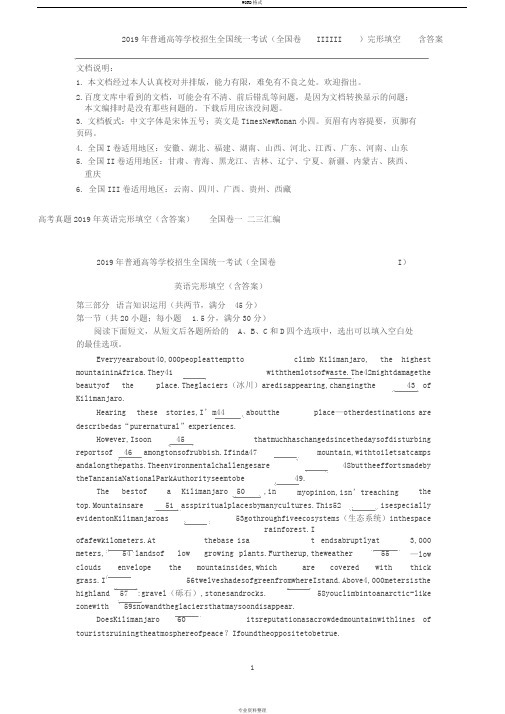
文档说明:1.本文档经过本人认真校对并排版,能力有限,难免有不良之处。
欢迎指出。
2.百度文库中看到的文档,可能会有不清、前后错乱等问题,是因为文档转换显示的问题;本文编排时是没有那些问题的。
下载后用应该没问题。
3.文档板式:中文字体是宋体五号;英文是TimesNewRoman小四。
页眉有内容提要,页脚有页码。
4.全国I卷适用地区:安徽、湖北、福建、湖南、山西、河北、江西、广东、河南、山东5.全国II卷适用地区:甘肃、青海、黑龙江、吉林、辽宁、宁夏、新疆、内蒙古、陕西、重庆6.全国III卷适用地区:云南、四川、广西、贵州、西藏高考真题2019年英语完形填空(含答案)全国卷一二三汇编2019年普通高等学校招生全国统一考试(全国卷I)英语完形填空(含答案)第三部分语言知识运用(共两节,满分45分)第一节(共20小题;每小题 1.5分,满分30分)阅读下面短文,从短文后各题所给的A、B、C和D四个选项中,选出可以填入空白处的最佳选项。
Everyyearabout40,000peopleattemptto climb Kilimanjaro,the highest mountaininAfrica.They41 withthemlotsofwaste.The42mightdamagethe beautyof the place.Theglaciers(冰川)aredisappearing,changingthe 43 of Kilimanjaro.Hearing these stories,I’m44 aboutthe place—otherdestinations are describedas“purernatural”experiences.However,Isoon 45 thatmuchhaschangedsincethedaysofdisturbing reportsof46amongtonsofrubbish.Ifinda47 mountain,withtoiletsatcamps andalongthepaths.Theenvironmentalchallengesare 48buttheeffortsmadeby theTanzaniaNationalParkAuthorityseemtobe 49.The bestof a Kilimanjaro 50 ,in myopinion,isn’treaching the top.Mountainsare 51 asspiritualplacesbymanycultures.This52 isespecially evidentonKilimanjaroas 53gothroughfiveecosystems(生态系统)inthespaceofafewkilometers.At thebase isa rainforest.It endsabruptlyat 3,000meters, 54 landsof low growing plants.Furtherup,theweather 55 —low clouds envelope the mountainsides,which are covered with thick grass.I 56twelveshadesofgreenfromwhereIstand.Above4,000metersisthe highland 57 :gravel(砾石),stonesandrocks. 58youclimbintoanarctic-like zonewith59snowandtheglaciersthatmaysoondisappear.DoesKilimanjaro 60 itsreputationasacrowdedmountainwithlines of touristsruiningtheatmosphereofpeace?Ifoundtheoppositetobetrue.141.A.keep B.mix C.connect D.bring42. A.stories B.buildings C.crowds D.reporters43. A.position B.age C.face 44. A.silent B.skeptical C.serious D.crazy45. A.discover B.argue C.decide D.advocate46. A.equipment B.grass C.camps D.stones47. A.remote B.quiet C.all D.clean48. A.new B.special C.significant D.necessary49. A.payingoff B.spreadingout C.blowingup D.fadingaway50. A.atmosphere B.experience C.experiment D.sight51. A.studied B.observed C.explored D.regarded52. A.view B.quality C.reason D.purpose53. A.scientists B.climbers C.locals D.officials54. A.holdingonto B.goingbackto C.livingupto D.givingwayto55. A.changes B.clears C.improves D.permits56. A.match B.imagine C.count D.add57. A.village B.desert C.road ke58. A.Obviously B.Easily C.Consequently D.Finally59. A.permanent B.little C.fresh D.artificial60. A.enjoy B.deserve C.save D.acquire2019年普通高等学校招生全国统一考试(全国卷II)英语完形填空(含答案)第三部分语言知识运用(共两节,满分45分)第一节(共20小题;每小题 1.5分,满分30分)阅读下面短文,从短文后各题所给的A、B、C和D四个选项中,选出可以填入空白处的最佳选项。
2020年普通高等学校招生全国统一考试英语试题(全国卷3,含答案)
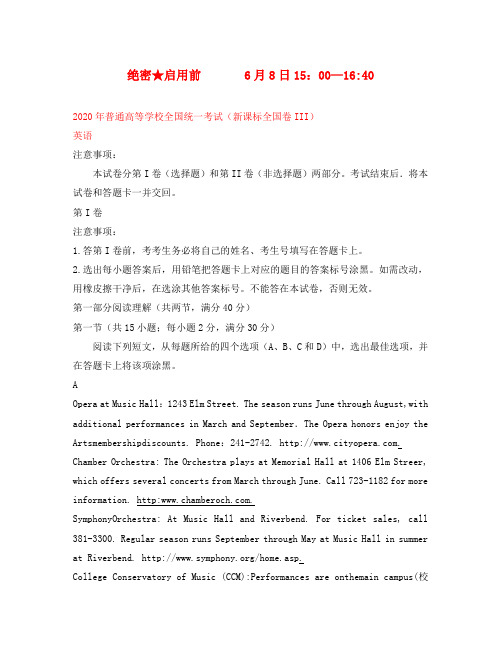
绝密★启用前 6月8日15:00—16:402020年普通高等学校全国统一考试(新课标全国卷III)英语注意事项:本试卷分第I卷(选择题)和第II卷(非选择题)两部分。
考试结束后.将本试卷和答题卡一并交回。
第I卷注意事项:1.答第I卷前,考考生务必将自己的姓名、考生号填写在答题卡上。
2.选出每小题答案后,用铅笔把答题卡上对应的题目的答案标号涂黑。
如需改动,用橡皮擦干净后,在选涂其他答案标号。
不能答在本试卷,否则无效。
第一部分阅读理解(共两节,满分40分)第一节(共15小题;每小题2分,满分30分)阅读下列短文,从每题所给的四个选项(A、B、C和D)中,选出最佳选项,并在答题卡上将该项涂黑。
AOpera at Music Hall:1243 Elm Street. The season runs June through August,with additional performances in March and September.The Opera honors enjoy the Artsmembershipdiscounts. Phone:241-2742. . Chamber Orchestra: The Orchestra plays at Memorial Hall at 1406 Elm Streer, which offers several concerts from March through June. Call 723-1182 for more information. http:.SymphonyOrchestra: At Music Hall and Riverbend. For ticket sales, call 381-3300. Regular season runs September through May at Music Hall in summer at Riverbend. /home.asp.College Conservatory of Music (CCM):Performances are onthemain campus(校园)ofthe university, usually at Patricia Cobbett Theater. CCM organizes a variety of events, including performances by the well-known Lasalle Quartet, CCM’s Philharmonic Orchestra, andvatiousgroups of musicians presenting Baroque through modern music Students with I.D card can attend the events for free. A free schedule of events for each term is available by calling the box office at 556-4183. /events/calendar. Riverbend Music Theater: 6295 Kellogg Ave. Large outdoor theater with the closest seats under cover (piecedifference).Big name shows all summer long! Phone:232-6220. http:///.1·Whichnumber shouldyoucallifyouwantto see opera?A 241-2742.B 723-1182.C 381-3300D 232-62202.When canyougotoaconcert byChamber OrchestraA.February. B May. C August. D November.3.Wherecanstudent go for free preformances with their ID cards?A.MusicHall.B .Memorial Hall.C.Patricia Cobbett Theater.D.RiverbendMusicTheater4·H ow isRiverbend MusicTheaterdifferentfrom the other places?A.Ithas seatsintheopenair.B.Itgives shows allyear roundC.Itoffersmembership discounts.D.It presentsfamousmusicalworksBOn one of her trips to New York several years ago, Eudora Welty decided to take a couple of New York friends out to dinner. They settled in at a comfortable East Slide caféand within minutes, another customer was approaching their table.“Hey, aren’t you from Mississippi?” the elegant, white-haired writer remembered being asked by the stranger. “I’m from Mississippi too.”Without a second thought, the woman joined the Welty party. When her dinner partner showed up, she also pulled up a chair.“They began telling me all the news ofMississippi,”Welty said. “I didn’t know what my New York friends were thinking.”Taxis on a rainy New York night are rarer than sunshine. By the time the group got up to leave, it was pouring outside. Welty’s new friends immediately sent a waiter to find a cab. Heading back downtown toward her hotel, her big-city friends were amazed at the turn of events that had changed their Big Apple dinner into a Mississippi“My friends said: ‘Now we believe your stories,’”Welty added. And I said: ‘Now you know. These are the people that make me write them.’”Sitting on a soda in her room, Welty, a slim figure in a simple gray dress, looked pleased with this explanation.“I don’t make them up,”she said of the characters in her fiction these last 50 or so years. “I don’t have to.”Beauticians, bartenders, piano players and people with purple hats, Welty’s people come from afternoons spent visiting with old friends, from walks through the streets of her native Jackson, Miss., from conversations overheard on a bus. It annoys Welty that, at 78, her left ear has now given out. Sometimes, sitting on a bus or a train, she hears only a fragment(片段) of a particularly interesting story.5.What happened when Welty was with her friends at the cafe?A. Two strangersjoined her.B. Her childhood friends came inC. Aheavy rain ruined the dinner.D.Some people held apartythere.6 .The underlined word “them” in Paragraph 6 refers to Welty’s__A.readers B parties C.friendsD stories7. Whatcanwelearn aboutthecharactersinWelty’s fiction?A. Theylivein bigcitiesB.TheyaremostlywomenC. Theycomefrom reallifeD.Theyare pleasure seekersCIf you are a fruit grower — or would like to become one —take advantage of Apple Day to see what’s around. It’s called Apple Day but in practice it’s more like Apple Month. The day itself is on October 21, but since it has caught on, events now spread out over most of October around Britain.Visiting an apple event is a good chance to see, and often taste, a wide variety of apples. To people who are used to the limited choice of apples such as Golden Delicious and Royal Gala in supermarkets, it can be quite an eye opener to see the range of classical apples still in existence, such as Decio which was grown by the Romans. Although it doesn’t taste of anything special, it’s still worth a try, as is the knobbly(多疙瘩的) Cat’s Head which is more of a curiosity than anything else.There are also varieties developed to suit specific local conditions. One of the very best varieties for eating quality is Orleans Reinette, but you’ll need a warm, sheltered place with perfect soil to grow it, so it’s a pipe dream for most apple lovers who fall for it.At the events, you can meet expert growers and discuss which ones will best suit your conditions, and because these are family affairs, children are well catered for with apple-themed fun and games.Apple Days are being held at all sorts of places with an interest in fruit,including stately gardens and commercial orchards(果园).If you want to have a real orchard experience, try visiting the National Fruit Collection at Brogdale,near Faversham in Kent.8.What can people do attheapple events?A .Attend experts’lectures.B .Visit fruit-loving families.C .Plantfruit trees inan orchard.D. Tastemanykinds ofapples.9.What can welearnaboutDecio?A.Itisanew variety.B.It has a strangelook.C. Itisrarely seen now.D.Ithas a specialtaste.10. Whatdoesthe un derlined phrase““a pipe dream””in Paragraph 3mean?A.Apracticalidea.B. A vain hope.C.A brilliant plan.D. A selfish desire.11.Whatisthe author’s p urpose inwritingthe text?A.To showhowto grow apples.B .Tointroduce an applefestival.C.Tohelppeople selectapples.D. Topromoteapple research.DBad news sells. If it bleeds, it leads. No news is good news, and good news is no news. Those are the classic rules for the evening broadcasts and the morning papers. But now that information is being spread and monitored(监控) in different ways, researchers are discovering new rules. By tracking people’s e-mails and online posts, scientists have found that good news can spread faster and farther than disasters and sob stories.“The ‘if it bleeds’ rule works for mass media,” says Jonah Berger, a scholar at the University of Pennsylvania. “They want your eyeballs anddon’t care how you’re feeling. But when you share a story with your friends, you care a lot more how they react. You don’t want them to think o f you as a Debbie Downer.”Researchers analyzing word-of-mouth communication—e-mails,Web posts and reviews, face-to-face conversations—found that it tended to be more positive than negative(消极的), but that didn’t necessarily mean people preferred positive news. Was positive news shared more often simply because people experienced more good things than bad things? To test for that possibility, Dr. Berger looked at how people spread a particular set of news stories: thousands of articles on The New York Times’ website. He and a Penn colleague analyzed the “most e-mailed” list for six months. One of his first finds was that articles in the science section were much more likely to make the list than non-science articles. He found that science amazed Times’ readers and made them want to share this positive feeling with others. Readers also tended to share articles that were exciting or funny, or that inspired negative feelings like anger or anxiety, but not articles that left them merely sad. They needed to be aroused(激发) one way or the other, and they preferred good news to bad. The more positive an article, the more likely it was to be shared, as Dr. Berger explains in his new book, “Contagi ous: Why Things Catch On.”12 .Whatdothe classic rulesmentionedinthetext apply to?A.News reports.B. Research papers.C .Private e-malls.D.Daily conversations.13. What canweinferaboutpeople like DebbieDowner?A.They’re sociallyinactive.B.They’re good at telling stories.C. They’re inconsiderate ofothers.D. They’re carefulwiththeirwords.14.Whichtendedtobethemost e-mailed accordingtoDr.Berger’s research?A .Sports new.B .Science articles.C.Personal accounts.D. Financial reviews.15 .What canbea suitable title forthetext?A.SadStoriesTravel FarWide.B .OnlineNewsAttractsMorePeople.C.ReadingHabitsChange withthe Times.D.GoodNewsBeatsBadon SocialNetworks.第二节 (共5小题;每小题2分,满分10分)根据短文内容,从短文后的选项中选出能填入空白处的最佳选项。
2018年全国卷Ⅲ英语高考试题(含答案)
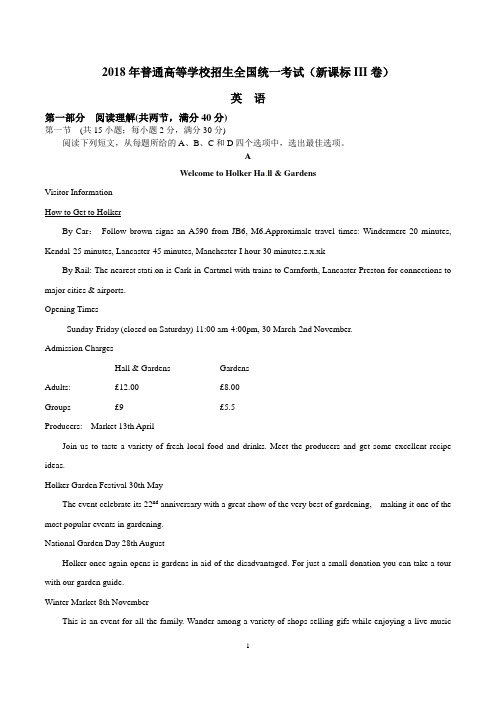
2018年普通高等学校招生全国统一考试(新课标III卷)英语第一部分阅读理解(共两节,满分40分)第一节(共15小题;每小题2分,满分30分)阅读下列短文,从每题所给的A、B、C和D四个选项中,选出最佳选项。
AWelcome to Holker Ha ll & GardensVisitor InformationHow to Get to HolkerBy Car:Follow brown signs an A590 from JB6, M6.Approximale travel times: Windermere-20 minutes, Kendal-25 minutes, Lancaster-45 minutes, Manchester-I hour 30 minutes.z.x.xkBy Rail: The nearest stati on is Cark-in-Cartmel with trains to Carnforth, Lancaster Preston for connections to major cities & airports.Opening TimesSunday-Friday (closed on Saturday) 11:00 am-4:00pm, 30 March-2nd November.Admission ChargesHall & Gardens GardensAdults: £12.00 £8.00Groups £9 £5.5Producers: Market 13th AprilJoin us to taste a variety of fresh local food and drinks. Meet the producers and get some excellent recipe ideas.Holker Garden Festival 30th MayThe event celebrate its 22nd anniversary with a great show of the very best of gardening, making it one of the most popular events in gardening.National Garden Day 28th AugustHolker once again opens is gardens in aid of the disadvantaged. For just a small donation you can take a tour with our garden guide.Winter Market 8th NovemberThis is an event for all the family. Wander among a variety of shops selling gifs while enjoying a live music1show and nice street entertainment.1. How long does it probably take a tourist to drive to Holker from Manchester?A. 20minutes.B.25 minutes.C.45 minutes.D.90 minutes.2. How much should a member of a tour group pay to visit to Hall & Cardens?A.£l2.00.B. B.19.00.C.A8.0D.45.503. Which event will you go to if you want to see a live music show?A. Producers' Market.B. Holker Garden Festival.C. National Garden Day.D. Winter Market.BCities usually have a good reason for being where they are, like a nearby port or river. People settle in these places because they are easy to get to and naturally suited to communications and trade. New York City, for example, is near a large harbour at the mouth of the Hudson River. Over 300 years its population grew gradually from 800 people to 8 million. But not all cities develop slowly over a long period of time. Boom towns grow from nothing almost overnight. In 1896, Dawson, Canada, was unmapped wilderness(荒野). But gold was discovered there in 1897, and two years later, it was one of the largest cities in the West, with a population of 30,000.Dawson did not have any of the natural conveniences of cities like London or Paris. People went there for gold. They travelled over snow-covered mountains and sailed hundreds of miles up icy rivers. The path to Dawson was covered with thirty feet of wet snow that could fall without warming. An avalanche(雪崩) once closed the path, killing 63 people. For many who made it to Dawson, however, the rewards were worth the difficult trip. Of the first 20,000 people who dug for gold, 4,000 got rich. About 100 of these stayed rich men for the rest of their lives.But no matter how rich they were, Dawson was never comfortable. Necessities like food and wood were very expensive. But soon, the gold that Dawson depended on had all been found. The city was crowded with disappointed people with no interest in settling down, and when they heard there were new gold discoveries in Alaska, they left Dawson City as quickly as they had come. Today, people still come and go — to see where the Canadian gold rush happened. Tourism is now the chief industry of Dawson City — its present population is 762.4. What attracted the early settlers to New York City?A. Its business culture.B. Its small population.C. Its geographical position.D. Its favourable climate.25. What do we know about those who first dug for gold in Dawson?A. Two-thirds of them stayed there.B. One out of five people got rich.C. Almost everyone gave up.D. Half of them died.6. What was the main reason for many people to leave Dawson?A. They found the city too crowded.B. They wanted to try their luck elsewhere.C. They were unable to stand the winter.D. They were short of food.7. What is the text mainly about?A. The rise and fall of a city.B. The gold rush in Canada.C. Journeys into the wilderness.D. Tourism in Dawson.CWhile famous foreign architects are invited to lead the designs of landmark buildings in China such as the new CCTV tower and the National Center for the Performing Arts, many excellent Chinese architects are making great efforts to take the center stage.Their efforts have been proven fruitful. Wang Shu, a 49-year-old Chinese architect, won the 2012 Pritzker Architecture Prize — which is often referred to as the Nobel Prize in architecture — on February 28. He is the first Chinese citizen to win this award.Wang serves as head of the Architecture Department at the China Academy of Art (CAA). His office is located at the Xiangshan campus(校园) of the university in Hangzhou, Zhejiang Province. Many buildings on the campus are his original creations.The style of the campus is quite different from that of most Chinese universities. Many visitors were amazed by the complex architectural space and abundant building types. The curves(曲线) of the buildings perfectly match the rise and fall of hills, forming a unique view.Wang collected more than 7 million abandoned bricks of different ages. He asked the workers to usetraditional techniques to make the bricks into walls, roofs and corridors. This creation attracted a lot of attention3thanks to its mixture of modern and traditional Chinese elements(元素).Wang’s works show a deep understanding of modern architecture and a good knowledge of traditions. Through such a balance, he had created a new type of Chinese architecture, said Tadao Ando, the winner of the 1995 Pritzker Prize.Wang believes traditions should not be sealed in glass boxes at museums. "That is only evidence that traditions once existed," he said."Many Chinese people have a misunderstanding of traditions. They think tradition means old things from the past. In fact, tradition also refers to the things that have been developing and that are still being created, " he said."Today, many Chinese people are learning Western styles and theories rather than focusing on Chinese traditions. Many people tend to talk about traditions without knowing what they really are, " said Wang.The study of traditions should be combined with practice. Otherwise, the recreation of traditions would be artificial and empty, he said.8. Wang’s wi nning of the prize means that Chinese architects are ___________.A. following the latest world trendB. getting international recognitionC. working harder than ever beforeD. relying on foreign architects9. What impressed visitors to the CAA Xiangshan campus most?A. Its hilly environment.B. Its large size.C. Its unique style.D. Its diverse functions.10. What made Wang’s architectural design a success?A. The mixture of different shapes.B. The balance of East and West.C. The use of popular techniques.D. The harmony of old and new.11. What should we do about Chinese traditions according to Wang?A. Spread them to the world.B. Preserve them at museums.C. Teach them in universities.D. Recreate them in practice.DAdults understand what it feels like to be flooded with objects. Why do we often assume that more is more4when it comes to kids and their belongings? The good news is that I can help my own kids learn earlier than I did how to live more with less.z.x.xkI found the pre-holidays a good time to encourage young children to donate less-used things, and it worked. Because of our efforts, our daughter Georgia did decide to donate a large bag of toys to a little girl whose mother was unable to pay for her holiday due to illness. She chose to sell a few larger objects that were less often used when we promised to put the money into her school fund(基金)(our kindergarten daughter is serious about becoming a doctor)For weeks, I've been thinking of bigger, deeper questions: How do we make it a habit for them? And how do we train ourselves to help them live with, need, and use less? Yesterday, I sat with my son, Shepherd, determined to test my own theory on this. I decided to play with him with only one toy for as long as it would keep his interest. I expected that one toy would keep his attention for about five minutes, ten minutes, max. I chose a red rubber ball-simple, universally available. We passed it, he tried to put it in his mouth, he tried bouncing it, rolling it, sitting on it, throwing it. It was totally, completely enough for him. Before I knew it an hour had passed and it was time to move on to lunch.We both became absorbed in the simplicity of playing together. He had my full attention and I had his. My little experiment to find joy in a single object worked for both of us.12. What do the words “more is more” in paragraph 1 probably mean?A. The more, the better.B. Enough is enough.C. More money, more worries.D. Earn more and spend more.13.What made Georgia agree to sell some of her objects?A. Saving up for her holidayB. Raising money for a poor girlB. Adding the money to her fund D. Giving the money to a sick mother14. Why did the author play the ball with Shepherd?A. To try out an ideaB. To show a parent's loveC. To train his attentionD. To help him start a hobby15. What can be a suitable title for the text?A. Take It or Leave ItB. A Lesson from KidsC. Live More with LessD. The Pleasure of Giving5第二节(共5小题;每小题2分,满分10分)根据短文内容,从短文后的选项中选出能填入空白处的最佳选项。
2020年普通高等学校招生全国统一考试(全国卷Ⅲ)英语试题及答案

绝密★启用前考试时间:2020年7月8日15:00-17:00 2020年普通高等学校招生全国统一考试(全国卷Ⅲ)英语试题试卷总分150分,考试时间120分钟注意事项:1. 答卷前,考生务必将自己的姓名、准考证号填写在答题卡和试卷指定位置上。
2. 回答选择题时,选出每小题答案后,用铅笔把答题卡上对应题目的答案标号涂黑。
如需改动,用橡皮擦干净后,再选涂其他答案标号。
回答非选择题时,将答案写在答题卡上,写在本试卷上无效。
3. 考试结束后,将本试卷和答题卡一并交回。
第一部分听力(共两节,满分30分)做题时,先将答案标在试卷上。
录音内容结束后,你将有两分钟的时间将试卷上的答案转涂到答题卡上。
第一节(共5小题;每小题1.5分,满分7.5分)听下面5段对话。
每段对话后有一个小题,从题中所给的A、B、C三个选项中选出最佳选项。
听完每段对话后,你都有10秒钟的时间来回答有关小题和阅读下一小题。
每段对话仅读一遍。
例:How much is the shirt?A. £19.15.B. £9.18.C. £9.15.答案是C。
1. Where does the conversation probably take place?A. In a supermarket.B. In the post office.C. In the street.2. What did Carl do?A. He designed a medal.B. He fixed a TV set.C. He took a test.3. What does the man do?A. He’s a tailor.B. H e’s a waiter.C. He’s a shop assistant.4. When will the flight arrive?A. At 18:20.B. At 18:35.C. At 18:50.5. How can the man improve his article?A. By deleting unnecessary words.B. By adding a couple of points.C. By correcting grammar mistakes.第二节(共15小题;每小题1.5分,满分22.5分)听下面5段对话或独白。
2020年全国卷3英语高考试题
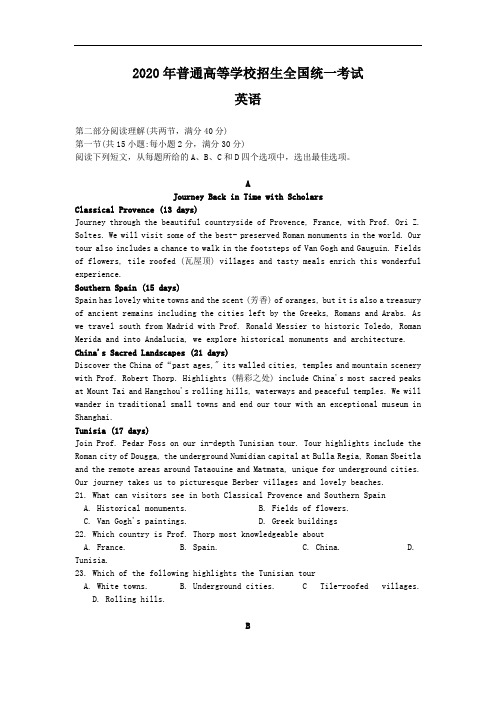
2020年普通高等学校招生全国统一考试英语第二部分阅读理解(共两节,满分40分)第一节(共15小题:每小题2分,满分30分)阅读下列短文,从每题所给的A、B、C和D四个选项中,选出最佳选项。
AJourney Back in Time with ScholarsClassical Provence (13 days)Journey through the beautiful countryside of Provence, France, with Prof. Ori Z. Soltes. We will visit some of the best- preserved Roman monuments in the world. Our tour also includes a chance to walk in the footsteps of Van Gogh and Gauguin. Fields of flowers, tile roofed (瓦屋顶) villages and tasty meals enrich this wonderful experience.Southern Spain (15 days)Spain has lovely white towns and the scent (芳香) of oranges, but it is also a treasury of ancient remains including the cities left by the Greeks, Romans and Arabs. As we travel south from Madrid with Prof. Ronald Messier to historic Toledo, Roman Merida and into Andalucia, we explore historical monuments and architecture. China's Sacred Landscapes (21 days)Discover the China of“past ages," its walled cities, temples and mountain scenery with Prof. Robert Thorp. Highlights (精彩之处) include China's most sacred peaks at Mount Tai and Hangzhou's rolling hills, waterways and peaceful temples. We will wander in traditional small towns and end our tour with an exceptional museum in Shanghai.Tunisia (17 days)Join Prof. Pedar Foss on our in-depth Tunisian tour. Tour highlights include the Roman city of Dougga, the underground Numidian capital at Bulla Regia, Roman Sbeitla and the remote areas around Tataouine and Matmata, unique for underground cities. Our journey takes us to picturesque Berber villages and lovely beaches.21. What can visitors see in both Classical Provence and Southern SpainA. Historical monuments.B. Fields of flowers.C. Van Gogh's paintings.D. Greek buildings22. Which country is Prof. Thorp most knowledgeable aboutA. France.B. Spain.C. China.D. Tunisia.23. Which of the following highlights the Tunisian tourA. White towns.B. Underground cities. C Tile-roofed villages.D. Rolling hills.BWhen “Rise of the Planet of the Ape s”was first shown to the public last month, a group of excited animal activists gathered on Hollywood Boulevard. But they weren't there to throw red paint on fur-coat- wearing film stars. Instead, one activist, dressed in a full-body monkey suit, had arrived with a sign praising the filmmakers: "Thanks for not using real apes (猿)!”The creative team behind “Apes”used motion-capture (动作捕捉) technology to create digitalized animals, spending tens of millions of dollars on technology that records an actor's performance and later processes it with computer graphics to create a final image (图像). In this case, one of a realistic-looking ape.Yet “Apes” is more exception than the rule. In fact, Hollywood has been hot on live animals lately. One nonprofit organization, which monitors the treatment of animals in filmed entertainment, is keeping tabs on more than 2,000 productions this year. Already, a number of films, including “Water for Elephants,”“The Hangover Part I” and “Zookeeper,” have drawn the anger of activists who say the creatures acting in them haven't been treated properly.In some cases, it's not so much the treatment of the animals on set in the studio that has activists worried; it's the off-set training and living conditions that are raising concerns. And there are questions about the films made outside the States, which sometimes are not monitored as closely as productions filmed in the States.24. Why did the animal activists gather on Hollywood BoulevardA. To see famous film stars.B. To oppose wearing fur coats.C. To raise money for animal protection.D. To express thanks to some filmmakers.25. What does paragraph 2 mainly talk aboutA. The cost of making “Apes.”B. The creation of digitalized apes.C. The publicity about “Apes.”D. The performance of real apes.26. What does the underlined phrase “keeping tabs on”in paragraph 3 probably meanA. Listing completely.B. Directing professionally.C. Promoting successfullyD. Watching carefully.27. What can we infer from the last paragraph about animal actorsA. They may be badly treated.B. They should take further training.C. They could be traded illegallyD. They would lose popularity.CWith the young unable to afford to leave home and the old at risk of isolation (孤独), more families are choosing to live together.The doorway to peace and quiet, for Nick Bright at least, leads straight to his mother-in-law: she lives on the ground floor, while he lives upstairs with his wife and their two daughters.Four years ago they all moved into a three-storey Victorian house in Bristol- one of a growing number of multigenerational families in the UK living together under the same roof. They share a front door and a washing machine, but Rita Whitehead has her own kitchen, bathroom, bedroom and living room on the ground floor.“We floated the idea to my mum of sharing a house,” says Kathryn Whitehead. Rita cuts in: “We spoke more with Nick because I think it's a big thing for Nick to live with his mother-in-law.”And what does Nick think “From my standpoint, it all seems to work very well. Would I recommend it Yes, I think I would.”It's hard to tell exactly how many people agree with him, but research indicates that the numbers have been rising for some time. Official reports suggest that the number of households with three generations living together had risen from 325,000 in 2001 to 419,000 in 2013.Other varieties of multigenerational family are more common. Some people live with their elderly parents; many more adult children are returning to the family home, if they ever left. It is said that about 20% of 25-34-year-olds live with their parents, compared with 16% in 1991. The total number of all multigenerational households in Britain is thought to be about million.Stories like that are more common in parts of the world, where multigenerational living is more firmly rooted. In India, particularly outside cities, young women are expected to move in with their husband's family when they get married.28. Who mainly uses the ground floor in the Victorian house in BristolA. Nick.B. Rita.C. Kathryn.D. The daughters.29. What is Nick's attitude towards sharing the house with his mother-in-lawA. Positive.B. Carefree.C. Tolerant.D. Unwilling.30. What is the author's statement about multigenerational family based onA. Family traditions.B. Financial reports.C. Published statistics.D. Public opinions.31. What is the text mainly aboutA. Lifestyles in different countries.B. Conflicts between generations.C. A housing problem in Britain.D. A rising trend of living in the UK.DWe are the products of evolution, and not just evolution that occurred billions of years ago. As scientists look deeper into our genes (基因), they are finding examples of human evolution in just the past few thousand years. People in Ethiopian highlands have adapted to living at high altitudes. Cattle -raising people in East Africa and northern Europe have gained a mutation (突变) that helps them digest milk as adults.On Thursday in an article published in Cell, a team of researchers reported a new kind of adaptation - not to air or to food, but to the ocean. A group of sea-dwelling people in Southeast Asia have evolved into better divers. The Bajau,as these people are known, number in the hundreds of thousands in Indonesia, Malaysia and the Philippines. They have traditionally lived on houseboats; in recent times, they've also built houses on stilts (支柱) in coastal waters. “They are simply a stranger to the land," said Redney C. Jubilado, a University of Hawaii researcher who studies the Bajau.Dr. Jubilado first met the Bajau while growing up on Samal Island in the Philippines. They made a living as divers, spearfishing or harvesting shellfish. "We were so amazed that they could stay underwater much longer than us local islanders," Dr. Jubilado said. “I could see them actually walking under the sea."In201, Melissa Ilardo, then a graduate student in genetics at the University of Copenhagen, heard about the Bajau. She wondered if centuries of diving could have led to the evolution of physical characteristics that made the task easier for them. “it seemed like the perfect chance for natural selection to act on a population," said Dr. Ilardo. She also said there were likely a number of other genes that help the Bajau dive.32. What does the author want to tell us by the examples in paragraph 1A. Environmental adaptation of cattle raisers.B. New knowledge of human evolution.C. Recent findings of human origin.D. Significance of food selection.33. Where do the Bajau build their housesA. In valleys.B. Near rivers.C. On the beach.D. Off the coast.34. Why was the young Jubilado astonished at the BajauA. They could walk on stilts all day.B. They had a superb way of fishing.C. They could stay long underwater.D. They lived on both land and water.35. What can be a suitable title for the textA. Bodies Remodeled for a Life at SeaB. Highlanders' Survival SkillsC. Basic Methods of Genetic ResearchD. The World's Best Divers第二节(共5小题: 每小题2分,满分10分)根据短文内容,从短文后的选项中选出能填入空白处的最佳选项。
英语试题【全国卷】

14.Why does the man sell the car?A.He can't afford the car. B.He wants to buy a new one. C.His cousin will go abroad to work.15.How many doors does this car have?A.Two doors. B.Four doors. C.The man doesn't know.16.What color is the car?A.Black. B.White. C.The man doesn't know.听第10段材料,回答第17至20题。
17.What has been wellknown to the world in China?A.The grape. B.The tea. C.The wine.18.How many prizes has Ningxia won in international competitions?A.6. B.About 200. C.Nearly 1,000.19.Which one isn't good for growing grapes?A.Enough sunshine. B.Much rainfall. C.A semisandy soil.20.How many Chinese wines are produced in Ningxia?A.Half. B.One fourth. C.130 million bottles.第二部分阅读理解(共两节,满分40分)第一节(共15小题;每小题2分,满分30分)阅读下列短文,从每题所给的A、B、C和D四个选项中,选出最佳选项。
AFrom virtual tours to elearning tools, museums and art galleries have been sharing resources using digital platforms to continue to connect with the public, share collections and stories.Hastings Museum and Art GalleryHastings Museum and Art Gallery is a museum in Hastings with a diverse collection of local history, fine decorative arts and natural science.In addition, we have launched a digital museum via Twitter, Facebook and Instagram.The British LibraryOur imaginative specialists managed to digitize the globes, which form one of the most beautiful parts in the British Library's vast map collection.The virtual globes would be made available for upclose interaction on the British Library's website throughout 2020, with the first ten due for release on 26 March.Art UKArt UK is the online home for every public art collection in the UK.Art UK is a charity, which features almost 250,000 digitized artworks available online.Through our work, We make art available to everyone—for enjoyment, learning and research.We also offer users the opportunity to create and share albums of artworks as well as “digital surrogate (替代的) exhibitions”.Leeds Art GalleryThe displays at Leeds Art Gallery have been selected by the staff to reflect the richness and variety of the collections.Established masterpieces are presented alongside lesserknown works.The exhibition includes recent acquisitions and longterm works from the collections.There are many collections—only a fraction (少量) of them are on display at any one time.When not on show, these may be seen by appointment at the Gallery.21.Which is the most inviting to a geography lover?A.Hastings Museum and Art Gallery. B.The British Library.C.Art UK. D.Leeds Art Gallery.22.What is special about Art UK?A.It is an ideal museum for a family. B.It has the largest collection of art works.C.It is a nonprofit art learning service. D.It displays lesserknown works besides famous ones. 23.What is the purpose of the text?A.To introduce virtual tour options. B.To inform readers of art events.C.To choose the best gallery in England. D.To popularize art knowledge to readers.BI have been a pet behaviorist for more than 25 years, helping animals “perform” on camera.But when a TV company asked if I could teach a dog to fly a plane, I faced the toughest challenge of my career.Initially, I was hesitant about the project, which involved taking rescued dogs through training to control a light aircraft.I wondered if the idea was in the animals' interests but was won over by the program's aim: to prove that an abandoned dog is more capable than people might expect.The crew were Alfie, Blondie and Shadow.We started with tasks that tested the dogs' memories and abilities, training them to perform complicated moves.By breaking down a complex trick into simpler tasks, I was able to get my boys to achieve performances.The tasks gave us a good feeling that dogs might be most suited to flight school.I was delighted when Alfie and Shadow made it through, with another trainer's dog, Reggie.We had six weeks to turn them into pilots.I built a copy of the plane's seats and controls.Another system in front of the dogs included lights—red for right, blue for left and white for straight.We operated it from the back.After six weeks, I was delighted at how far the dogs had come.Their final test was to perform the figure “8”,making turns while controlling their altitude.We needed a human copilot to take them to 3,000 feet before giving control to the dogs.All of them performed admirably, flying the plane for a few minutes at a time.According to this program, I realize that every animal has the potential to achieve amazing things if given the chance.24.Why didn't the author take the program at first?A.He doubted whether it was good for the animals.B.Unwanted dogs' abilities were beyond expectations.C.It was the biggest challenge. D.The dogs might not be interested.25.How did the author train the dogs to fly a plane?A.He got help from three human assistants.B.He trained the dogs on a real plane.C.He used small tasks to train the dogs step by step.D.He let the dogs operate the aircraft on their own.26.What did the dogs do on the final test?A.They flew the plane in the shape of the number 8.B.They flew the plane to 3,000 feet high.C.They flew the plane only in straight lines.D.They were helped by humans all the way.27.Which of the following can best describe the author?A.Intelligent but cruel. B.Considerate and organized.C.Powerful but dishonest. D.Realistic and loyal.CA joint research team recently have developed a new electronic skin that is similar to human skin in strength, durability and sensitivity.The skin or eskin may play an important role in nextgeneration personalized medicine, soft robotics and artificial intelligence (AI).“The ideal eskin will mimic (模仿) the many natural functions of human skin, such as sensing temperature and the touch, accurately and in real time,” says leading researcher Yichen Cai.However, making suitably flexible electronics that can perform such delicate tasks while also used repeatedly is challenging, and each material involved must be carefully engineered.Most eskins are made by putting an active sensor on the surface that is attached to human skin.However, the connection between them is often too weak, which reduces the durability and sensitivity of the material; otherwise, if it is too strong, it won't be flexible enough, making it more likely to break the circuit.“The landscape of skin electronics keeps shifting at a remarkable pace,” says Cai.“The discovery of 2D sensors has accelerated efforts to turn these quite thin but strong materials intofunctional, durable and artificial skins.”The new manmade skin built by the researchers could sense objects from 20 centimeters away.It could further make a quick response when touched in less than one tenth of a second.“It is a striking achievement for an eskin to maintain toughness after repeated use,” said Shen, another researcher, “which mimics the softness and rapid recovery of human skin.”This type of eskin could monitor a range of biological information, such as changes in blood pressure, which can be detected from movements of arms and legs.This data can then be shared and stored in the cloud via WiFi.“One remaining problem of the widespread use of eskins lies in mass production of highresolution sensors,” adds group leader Vincent Tung, “however, the latest technology offers new promise.”28.What's the feature of the new eskin?A.It's flexible and sensitive. B.It is almost the same as human skin.C.It has fragile electronics. D.It has proved important in areas like AI.29.What can the new eskin do?A.It can rapidly react to the touch. B.It can change humans' blood pressure.C.It can heal the wounded skin quickly. D.It can adjust humans' temperature.30.What does the underlined word “striking” in paragraph 5 probably mean?A.Slight. B.Noticeable. C.Wellknown.D.Insignificant.31.What is the best title for the text?A.A Breakthrough in High Technology B.Manmade Skin ImprovedC.The Types of Eskin D.The Widespread Use of EskinDHow much free time do you need to be happier?Feeling overwhelmed by your todo list can certainly make you unhappy, but new research suggests that more free time might not be the elixir (灵丹妙药) like many of us have dreamed.Researchers found that people with more free time generally had higher levels of subjective wellbeing(幸福)—but only up to a point.People who had up to two hours of free time a day generally reported they felt better than those who had less time.But people who had five or more hours of free time a day generally said they felt worse.“While too little time is bad, having more time is not always better,” said Marissa Sharif, an assistant professor of marketing at the Wharton School.For example, some adults struggle with the “retirement blues”,which can be due to much free time.They conducted several smaller online experiments.In one they asked participants to imagine having 3.5 to 7 free hours per day.They were asked to imagine spending that time doing “productive” things(like exercising) or to imagine doing “unproductive” activities (like watching TV).The participants believed their wellbeing would suffer if they had a lot of free time during the day—but only if they used it unproductively.“In other words, how people use their free time matters,” Sharif said.“Of course, what feels ‘productive’ is up to you.Freetime activities like knitting, reading, cooking or gaming are also known to put people in a state of flow.When people do find themselves with excessive (过多的) amounts of spare time, such as retirement or having left a job, our results suggest these individuals would benefit from spending their newfound time with purpose.”32.What is the finding of the new study?A.Adults tend to feel happy in their free time.B.Being too busy threatens people's physical health.C.More free time does not definitely mean more happiness.D.More and more people have little spare time.33.Why does the author mention the example in paragraph 2?A.To emphasize the significance of spending free time.B.To indicate the reasons for adults' being upset.C.To forecast the retirement life in the future.D.To prove the discovery of the new research.34.What can we infer from Sharif's words in the last paragraph?A.Taking good advantage of free time will help bring people happiness.B.Attending too many activities may damage people's health.C.Spending spare time with friends often benefits people a lot.D.Having little free time may result in anxiety.35.What is the passage mainly about?A.The relationship between free time and happiness. B.The significance of money.C.The retirement life. D.The productive activities.第二节(共5小题;每小题2分,满分10分)根据短文内容,从短文后的选项中选出能填入空白处的最佳选项。
2016年普通高等学校招生全国统一考试课标全国卷Ⅲ(含答案)
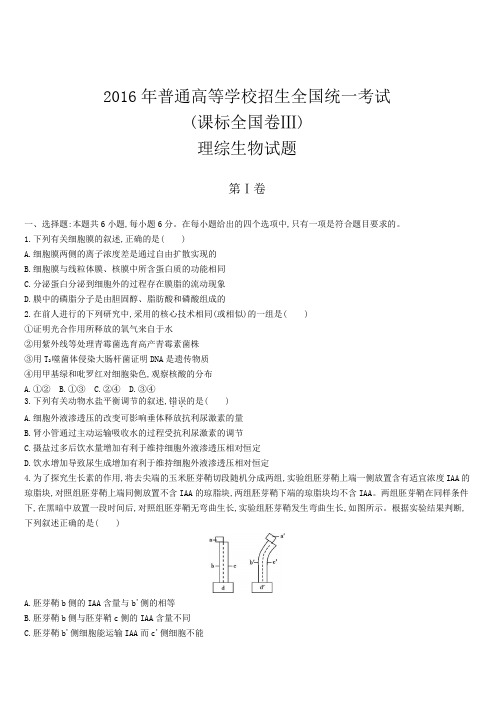
2016年普通高等学校招生全国统一考试(课标全国卷Ⅲ)理综生物试题第Ⅰ卷一、选择题:本题共6小题,每小题6分。
在每小题给出的四个选项中,只有一项是符合题目要求的。
1.下列有关细胞膜的叙述,正确的是( )A.细胞膜两侧的离子浓度差是通过自由扩散实现的B.细胞膜与线粒体膜、核膜中所含蛋白质的功能相同C.分泌蛋白分泌到细胞外的过程存在膜脂的流动现象D.膜中的磷脂分子是由胆固醇、脂肪酸和磷酸组成的2.在前人进行的下列研究中,采用的核心技术相同(或相似)的一组是( )①证明光合作用所释放的氧气来自于水②用紫外线等处理青霉菌选育高产青霉素菌株③用T2噬菌体侵染大肠杆菌证明DNA是遗传物质④用甲基绿和吡罗红对细胞染色,观察核酸的分布A.①②B.①③C.②④D.③④3.下列有关动物水盐平衡调节的叙述,错误..的是( )A.细胞外液渗透压的改变可影响垂体释放抗利尿激素的量B.肾小管通过主动运输吸收水的过程受抗利尿激素的调节C.摄盐过多后饮水量增加有利于维持细胞外液渗透压相对恒定D.饮水增加导致尿生成增加有利于维持细胞外液渗透压相对恒定4.为了探究生长素的作用,将去尖端的玉米胚芽鞘切段随机分成两组,实验组胚芽鞘上端一侧放置含有适宜浓度IAA的琼脂块,对照组胚芽鞘上端同侧放置不含IAA的琼脂块,两组胚芽鞘下端的琼脂块均不含IAA。
两组胚芽鞘在同样条件下,在黑暗中放置一段时间后,对照组胚芽鞘无弯曲生长,实验组胚芽鞘发生弯曲生长,如图所示。
根据实验结果判断,下列叙述正确的是( )A.胚芽鞘b侧的IAA含量与b'侧的相等B.胚芽鞘b侧与胚芽鞘c侧的IAA含量不同C.胚芽鞘b'侧细胞能运输IAA而c'侧细胞不能D.琼脂块d'从a'中获得的IAA量小于a'的输出量5.我国谚语中的“螳螂捕蝉,黄雀在后”体现了食物链的原理。
若鹰迁入了蝉、螳螂和黄雀所在的树林中,捕食黄雀并栖息于林中。
2020年普通高等学校招生全国统一考试英语 (全国卷Ⅲ解析版)
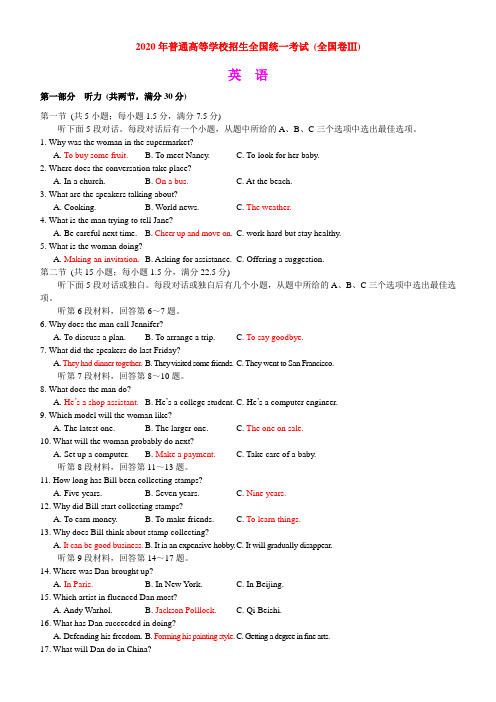
2020年普通高等学校招生全国统一考试(全国卷Ⅲ)英语第一部分听力(共两节,满分30分)第一节(共5小题;每小题1.5分,满分7.5分)听下面5段对话。
每段对话后有一个小题,从题中所给的A、B、C三个选项中选出最佳选项。
1. Why was the woman in the supermarket?A. To buy some fruit.B. To meet Nancy.C. To look for her baby.2. Where does the conversation take place?A. In a church.B. On a bus.C. At the beach.3. What are the speakers talking about?A. Cooking.B. World news.C. The weather.4. What is the man trying to tell Jane?A. Be careful next time.B. Cheer up and move on.C. work hard but stay healthy.5. What is the woman doing?A. Making an invitation.B. Asking for assistance.C. Offering a suggestion.第二节(共15小题;每小题1.5分,满分22.5分)听下面5段对话或独白。
每段对话或独白后有几个小题,从题中所给的A、B、C三个选项中选出最佳选项。
听第6段材料,回答第6~7题。
6. Why does the man call Jennifer?A. To discuss a plan.B. To arrange a trip.C. To say goodbye.7. What did the speakers do last Friday?A. They had dinner together.B. They visited some friends.C. They went to San Francisco.听第7段材料,回答第8~10题。
2019年普通高等学校招生全国统一考试全国卷3英语试卷及答案
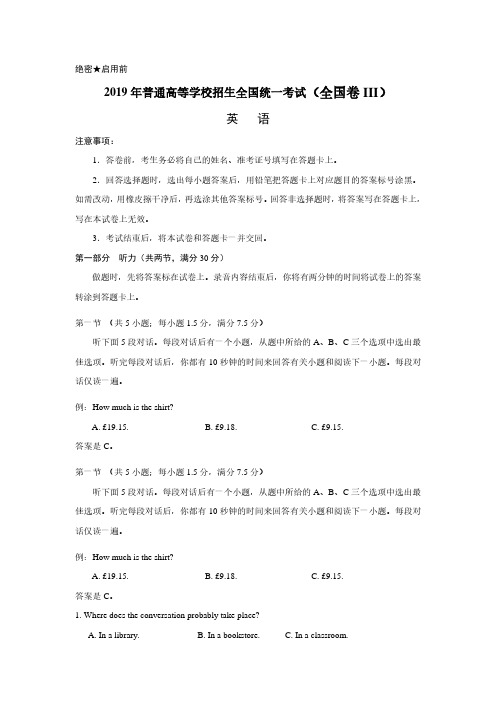
绝密★启用前2019年普通高等学校招生全国统一考试(全国卷III)英语注意事项:1.答卷前,考生务必将自己的姓名、准考证号填写在答题卡上。
2.回答选择题时,选出每小题答案后,用铅笔把答题卡上对应题目的答案标号涂黑。
如需改动,用橡皮擦干净后,再选涂其他答案标号。
回答非选择题时,将答案写在答题卡上,写在本试卷上无效。
3.考试结束后,将本试卷和答题卡一并交回。
第一部分听力(共两节,满分30分)做题时,先将答案标在试卷上。
录音内容结束后,你将有两分钟的时间将试卷上的答案转涂到答题卡上。
第一节(共5小题;每小题1.5分,满分7.5分)听下面5段对话。
每段对话后有一个小题,从题中所给的A、B、C三个选项中选出最佳选项。
听完每段对话后,你都有10秒钟的时间来回答有关小题和阅读下一小题。
每段对话仅读一遍。
例:How much is the shirt?A. £19.15.B. £9.18.C. £9.15.答案是C。
第一节(共5小题;每小题1.5分,满分7.5分)听下面5段对话。
每段对话后有一个小题,从题中所给的A、B、C三个选项中选出最佳选项。
听完每段对话后,你都有10秒钟的时间来回答有关小题和阅读下一小题。
每段对话仅读一遍。
例:How much is the shirt?A. £19.15.B. £9.18.C. £9.15.答案是C。
1. Where does the conversation probably take place?A. In a library.B. In a bookstore.C. In a classroom.2. How does the woman feel now?A. Relaxed.B. Excited.C. Tired.3. How much will the man pay?A. $520.B. $80.C. $100.4. What does the man tell Jane to do?A. Postpone his appointment.B. Meet Mr. Douglas.C. Return at 3 o’clock.5. Why would David quit his job?A. To go back to school.B. To start his own firm.C. To work for his friend.第二节(共15小题;每小题1.5分,满分22.5分)听下面5段对话或独白。
2019年全国统一高考英语试卷(新课标ⅲ)(含解析版)真题全国卷三3III有答案
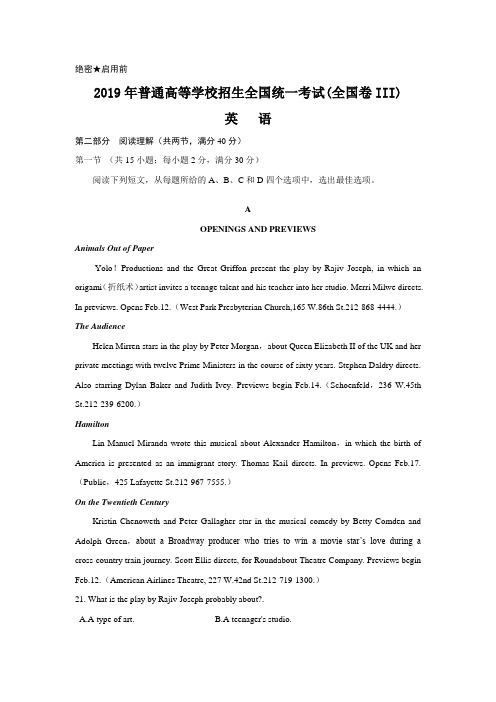
"China is impossible to overlook," says Hill. "Chinese models are the faces of beauty and fashion campaigns that sell dreams to women all over the world, which means Chinese women are not just consumers of fashion — they are central to its movement. "Of course, only are today's top Western designers being influenced by China — some of the best designers of contemporary fashion are themselves Chinese." Vera Wang, Alexander Wang, Jason Wu aretaking onGaliano, Albaz, Marc Jacobs-and beating them hands down in design and sales," adds Hill.
- 1、下载文档前请自行甄别文档内容的完整性,平台不提供额外的编辑、内容补充、找答案等附加服务。
- 2、"仅部分预览"的文档,不可在线预览部分如存在完整性等问题,可反馈申请退款(可完整预览的文档不适用该条件!)。
- 3、如文档侵犯您的权益,请联系客服反馈,我们会尽快为您处理(人工客服工作时间:9:00-18:30)。
绝密★启用前6月8日15:00—16:402016年普通高等学校全国统一考试(新课标全国卷III)英语注意事项:本试卷分第I卷(选择题)和第II卷(非选择题)两部分。
考试结束后.将本试卷和答题卡一并交回。
第I卷注意事项:1.答第I卷前,考考生务必将自己的姓名、考生号填写在答题卡上。
2.选出每小题答案后,用铅笔把答题卡上对应的题目的答案标号涂黑。
如需改动,用橡皮擦干净后,在选涂其他答案标号。
不能答在本试卷,否则无效。
第一部分阅读理解(共两节,满分40分)第一节(共15小题;每小题2分,满分30分)阅读下列短文,从每题所给的四个选项(A、B、C和D)中,选出最佳选项,并在答题卡上将该项涂黑。
AOpera at Music Hall:1243 Elm Street. The season runs June through August,with additional performances in March and September.The Opera honors enjoy the Artsmembershipdiscounts. Phone:241-2742. .Chamber Orchestra: The Orchestra plays at Memorial Hall at 1406 Elm Streer, which offers several concerts from March through June. Call 723-1182 for more information. http:. SymphonyOrchestra: At Music Hall and Riverbend. For ticket sales, call 381-3300. Regular season runs September through May at Music Hall in summer at Riverbend. /home.asp.College Conservatory of Music (CCM):Performances are onthemain campus(校园)ofthe university, usually at Patricia Cobbett Theater. CCM organizes a variety of events, including performances by the well-known Lasalle Quartet, CCM’s Philharmonic Orchestra, andvatiousgroups of musicians presenting Baroque through modern music Students with I.D card can attend the events for free. A free schedule of events for each term is available by calling the box office at 556-4183. /events/calendar.Riverbend Music Theater: 6295 Kellogg Ave. Large outdoor theater with the closest seats under cover(piecedifference).Big name shows all summer long! Phone:232-6220. http:///. 1·Whichnumber shouldyoucallifyouwanttosee opera?A 241-2742.B 723-1182.C 381-3300D 232-62202.When canyougotoaconcert byChamber Orches traA.February. B May. C August. D November.3.Wherecanstudent go for free preformances with their ID cards?A.MusicHall.B .Memorial Hall.C.Patricia Cobbett Theater.D.RiverbendMusicTheater4·How isRiverbend MusicTheaterdifferentfrom the other places?A.Ithas seatsintheopenair.B.Itgives shows allyear roundC.Itoffersmembership discounts.D.It presentsfamousmusicalworksBOn one of her trips to New York several years ago, Eudora Welty decided to take a couple of New York friends out to dinner. They settled in at a comfortable East Slide caféand within minutes, another customer was approaching their table.“Hey, aren’t you from Mississippi?” the elegant, white-haired writer remembered being asked by the stranger. “I’m from Mississippi too.”Without a second thought, the woman joined the Welty party. When her dinner partner showed up, she also pulled up a chair.“They began telling me all the news ofMississippi,” Welty said. “I didn’t know what my New York friends were thinking.”Taxis on a rainy New York night are rarer than sunshine. By the time the group got up to leave, it was pouring outside. Welty’s new friends immediately sent a waiter to find a cab. Heading back downtown toward her hotel, her big-city friends were amazed at the turn of events that had changed their Big Apple dinner into a Mississippi“My friends said: ‘Now we believe your stories,’” Welty added. And I said: ‘Now you know. These are the people that make me write them.’”Sitting on a soda in her room, Welty, a slim figure in a simple gray dress, looked pleased with this explanation.“I don’t make them up,” she said of the characters in her fiction these last 50 or so years. “I don’t have to.”Beauticians, bartenders, piano players and people with purple hats, Welty’s people come from afternoons spent visiting with old friends, from walks through the streets of her native Jackson, Miss., from conversations overheard on a bus. It annoys Welty that, at 78, her left ear has now given out. Sometimes, sitting on a bus or a train, she hears only a fragment(片段) of a particularly interesting story.5.What happened when Welty was with her friends at the cafe?A. Two strangersjoined her.B. Her childhood friends came inC. Aheavy rain ruined the dinner.D.Some people held apartythere.6 .The underlined word “them” in Paragraph 6 refers to Welty’s__A.readers B parties C.friendsD stories7. Whatcanwelearn aboutthecharactersinWelty’s fiction?A. Theylivein bigcitiesB.TheyaremostlywomenC. Theycomefrom reallifeD.Theyare pleasure seekersCIf you are a fruit grower —or would like to become one —take advantage of Apple Day to see what’s around. It’s called Apple Day but in practice it’s more like Apple Month. The day itself is on October 21, but since it has caught on, events now spread out over most of October around Britain.Visiting an apple event is a good chance to see, and often taste, a wide variety of apples. To people who are used to the limited choice of apples such as Golden Delicious and Royal Gala in supermarkets, it can be quite an eye opener to see the range of classical apples still in existence, such as Decio which was grown by the Romans. Although it doesn’t taste of anything special, it’s still worth a try, as is the knobbly(多疙瘩的) Cat’s Head which is more of a curiosity than anything else.There are also varieties developed to suit specific local conditions. One of the very best varieties for eating quality is Orleans Reinette, but you’ll need a warm, sheltered place with perfect soil to grow it, so it’s a pipe dream for most apple lovers who fall for it.At the events, you can meet expert growers and discuss which ones will best suit your conditions, and becausethese are family affairs, children are well catered for with apple-themed fun and games.Apple Days are being held at all sorts of places with an interest in fruit,including stately gardens and commercial orchards(果园).If you want to have a real orchard experience, try visiting the National Fruit Collection at Brogdale,near Faversham in Kent.8.What can people do attheapple events?A .Attend experts’lectures.B .Visit fruit-loving families.C .Plantfruit trees inan orchard.D. Tastemanykinds ofapples.9.What can welearnaboutDecio?A.Itisanew variety.B.It has a strangelook.C. Itisrarely seen now.D.Ithas a specialtaste.10. Whatdoesthe un derlined phrase““a pipe dream””in Paragraph 3mean?A.Apracticalidea.B. A vain hope.C.A brilliant plan.D. A selfish desire.11.Whatisthe author’s p urpose inwritingthe text?A.To showhowto grow apples.B .Tointroduce an applefestival.C.Tohelppeople selectapples.D. Topromoteapple research.DBad news sells. If it bleeds, it leads. No news is good news, and good news is no news. Those are the classic rules for the evening broadcasts and the morning papers. But now that information is being spread and monitored(监控) in different ways, researchers are discov ering new rules. By tracking people’s e-mails and online posts, scientists have found that good news can spread faster and farther than disasters and sob stories.“The ‘if it bleeds’ rule works for mass media,” says Jonah Berger, a scholar at the Univer sity of Pennsylvania. “They want your eyeballs and don’t care how you’re feeling. But when you share a story with your friends, you care a lot more how they react. You don’t want them to think of you as a Debbie Downer.”Researchers analyzing word-of-mouth communication—e-mails,Web posts and reviews, face-to-face conversations—found that it tended to be more positive than negative(消极的), but that didn’t necessarily mean people preferred positive news. Was positive news shared more often simply because people experienced more good things than bad things? To test for that possibility, Dr. Berger looked at how people spread a particular set ofnews stories: thousands of articles on The New York Times’ website. He and a Penn colleague analyzed the “most e-mai led” list for six months. One of his first finds was that articles in the science section were much more likely to make the list than non-science articles. He found that science amazed Times’ readers and made them want to share this positive feeling with others.Readers also tended to share articles that were exciting or funny, or that inspired negative feelings like anger or anxiety, but not articles that left them merely sad. They needed to be aroused(激发) one way or the other, and they preferred good news to bad. The more positive an article, the more likely it was to be shared, as Dr. Berger explains in his new book, “Contagious: Why Things Catch On.”12 .Whatdothe classic rulesmentionedinthetext apply to?A.News reports.B. Research papers.C .Private e-malls.D.Daily conversations.13. What canweinferaboutpeople like DebbieDowner?A.They’re sociallyinactive.B.They’re good at telling stories.C. They’re inconsiderate ofothers.D. They’re carefulwiththeirwords.14.Whichtendedtobethemost e-mailed accordingtoDr.Berger’s research?A .Sports new.B .Science articles.C.Personal accounts.D. Financial reviews.15 .What canbea suitable title forthetext?A.SadStoriesTravel FarWide.B .OnlineNewsAttractsMorePeople.C.ReadingHabitsChange withthe Times.D.GoodNewsBeatsBadon SocialNetworks.第二节(共5小题;每小题2分,满分10分)根据短文内容,从短文后的选项中选出能填入空白处的最佳选项。
